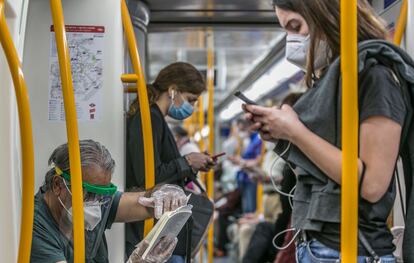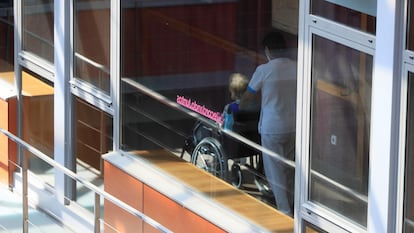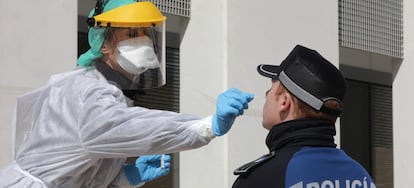The mystery of Madrid’s lack of coronavirus outbreaks
Despite reporting new infections every day, health officials claim there are only four clusters of related cases in the entire region, which has Spain's third-largest population

Every day for some time now, Madrid authorities have been reporting more confirmed coronavirus cases than most other regions, yet fewer outbreaks.
This is not an official classification, as the Spanish Health Ministry does not provide this kind of data. Instead, the media have been compiling the information based on regional government reports.
Following the end of confinement measures on June 21, Madrid did not report its first new outbreak until July 3. Another one confirmed on Wednesday of this week brings the total to four.
That is a remarkably low number for Spain’s third most populated region (6.6 million people), which also has the best transportation links with the rest of the country, and which also happened to be the epicenter of Spain’s coronavirus epidemic between March and June.
Experts consulted by this newspaper, including Health Ministry technicians, are asking themselves two questions: where are those 30, 40, 50 daily new positives coming from? And why are they not being grouped together in related clusters?
Good news, bad news
What would appear to be good news – there are very few outbreaks in Madrid – is in fact bad news: regional health authorities are unable to conduct efficient contact tracing that might show a link between these cases.
Instead, there is a constant trickle of confirmed cases as a result of people getting tested at the workplace, or as part of hospital checks prior to surgeries. But there is no efficient follow-up of contacts that might result in what is officially defined as an outbreak, which is three or more cases with ties outside the family, or one case in a senior home.
The Madrid health department holds that all reported cases have been detected in family settings and are classified as mild. But that still begs the question: where did these families catch the virus?
Several sources consulted by this newspaper said that contact tracing resources are stretched thin at hospitals, primary healthcare centers and within the regional government’s own health services. Tracers are taking on cases late, and they are not given enough time to do an in-depth job.
To some degree, the same thing is happening across Spain: for every positive case, an average of four contacts are being traced. In other countries, that figure is closer to 14, according to Helena Legido-Quigley, a public health expert who teaches at the National University of Singapore.
Care homes

As for Madrid, one might wonder how it is possible that no cases have been reported at a single senior care home, after these centers became a hotspot of infection at the height of the pandemic.
According to the official definition, just one case in a care home should be viewed as an outbreak. Although the regional health department admitted that there have been coronavirus diagnoses at senior residences in the last 14 days, they are not being reported as such, nor is any additional information being provided. “We report to the ministry everything that needs to be reported,” said a spokesperson.
According to the Spanish Health Ministry, there were 762 confirmed cases in Madrid in the last 14 days. According to regional authorities, the figure is 588, and no explanation has been provided by either government department for this discrepancy. Of these, only 23 cases have been grouped into four outbreaks, and 103 close contacts are being monitored. None of these individuals have been admitted into hospital.
The last reported outbreak involves five out of eight people who attended a family dinner at a private home in Madrid on July 4. Because three positive cases and two contacts then went back to their homes in Galicia, Castilla y León, Basque Country, Catalonia and Andalusia, 61 additional people are being monitored in those regions as well.
Limited tracing capabilities

Several primary care physicians and hospital doctors in the Madrid region said that the problem is not so much the ability to diagnose cases as the understaffed tracing system.
“The delays in tracing make it difficult to establish whether an outbreak has occurred, as people start to forget the places where they were. At my health center, we have documented delays of up to a week before a patient was contacted by public health workers to determine their contacts,” said Javier Padilla, a primary healthcare physician.
Most hospitals say they have the resources to perform as many PCR tests and lab work as required, and that in any case the volume of work is going down. In many cases, positives are showing up when people coming in for unrelated issues such as a check-up or surgery get automatically tested for coronavirus, which has become mandatory at medical centers. Most of these cases are asymptomatic. It is a similar story at most primary healthcare centers, where the situation is one of “tense calm.”
“I think the situation is clear: we are not seeing the detection and follow-up work due to a lack of personnel. So no outbreaks are being identified, even though they are really there,” said a health professional at one of these centers.
The normal thing would be for outbreaks to occurPedro Guillón, Spanish Epidemiology Society
Every source consulted by this newspaper pointed at Madrid’s public health services. Regional authorities pledged to bring in 400 new staffers when the Health Ministry demanded additional resources before allowing Madrid to ease confinement measures as part of the national de-escalation plan. Later, the promise was reduced to 172 new workers. But by mid-July, there were only about 30 new employees in the public health services.
“Right now, the department is very short on resources. It is not as dramatic as back in March or April, also because there are fewer cases, but there aren’t enough people to cover the daily demand in terms of cases,” said a worker who spoke on condition of anonymity.
The second problem is technical in nature. “There is a lot of personnel involved in the information that needs to be put out there – primary healthcare, hospitals, the public health department – and the mechanisms, system and information flow are not optimal,” added the same source, noting that the regional government is now trying to streamline the process “to make it faster and automatic, with fewer steps.”
Insufficient information
Fernando Rodríguez-Artalejo, a professor at the Madrid Autonomous University’s School of Preventive Medicine and Public Health, says that regional officials are releasing very little information, and that this makes it hard to know exactly what is failing.
“It would be good for them to provide a clearer description of the origin of the 20 to 50 daily cases, whether they were national or imported, what percentage are asymptomatic, the time that elapsed between the onset of symptoms and the diagnosis, the rate of positives among all tested individuals, the total number of tests that were carried out, the number of contacts traced and quarantined, the proportion of patients where the source of contagion has been identified... all this would help understand things better. For instance, if there are not many cases but many tests are being done – on all those with compatible signs and on some asymptomatic people – we could all feel much more at ease.”
Pedro Gullón, of the Spanish Epidemiology Society, says that the lack of information turns the Madrid cases into “a mystery.” “Transmission is not going down, although at least it is not going up,” he said. “The normal thing would be for outbreaks to occur.”
English version by Susana Urra.
Tu suscripción se está usando en otro dispositivo
¿Quieres añadir otro usuario a tu suscripción?
Si continúas leyendo en este dispositivo, no se podrá leer en el otro.
FlechaTu suscripción se está usando en otro dispositivo y solo puedes acceder a EL PAÍS desde un dispositivo a la vez.
Si quieres compartir tu cuenta, cambia tu suscripción a la modalidad Premium, así podrás añadir otro usuario. Cada uno accederá con su propia cuenta de email, lo que os permitirá personalizar vuestra experiencia en EL PAÍS.
¿Tienes una suscripción de empresa? Accede aquí para contratar más cuentas.
En el caso de no saber quién está usando tu cuenta, te recomendamos cambiar tu contraseña aquí.
Si decides continuar compartiendo tu cuenta, este mensaje se mostrará en tu dispositivo y en el de la otra persona que está usando tu cuenta de forma indefinida, afectando a tu experiencia de lectura. Puedes consultar aquí los términos y condiciones de la suscripción digital.








































